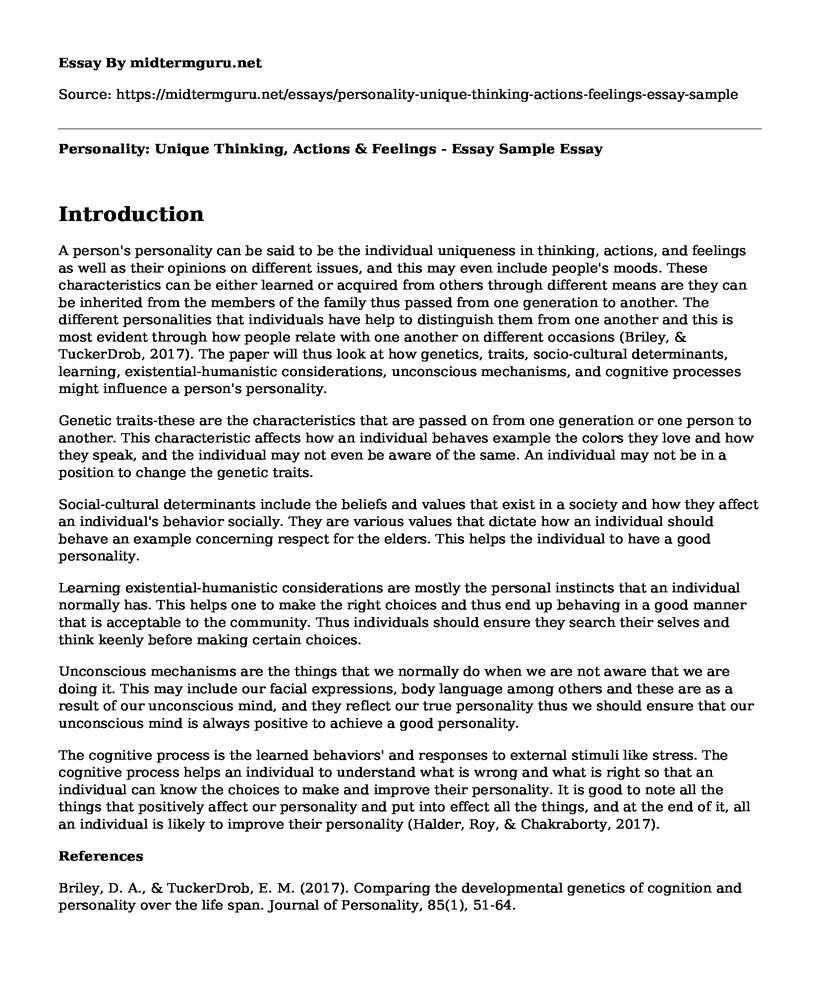Introduction
A person's personality can be said to be the individual uniqueness in thinking, actions, and feelings as well as their opinions on different issues, and this may even include people's moods. These characteristics can be either learned or acquired from others through different means are they can be inherited from the members of the family thus passed from one generation to another. The different personalities that individuals have help to distinguish them from one another and this is most evident through how people relate with one another on different occasions (Briley, & TuckerDrob, 2017). The paper will thus look at how genetics, traits, socio-cultural determinants, learning, existential-humanistic considerations, unconscious mechanisms, and cognitive processes might influence a person's personality.
Genetic traits-these are the characteristics that are passed on from one generation or one person to another. This characteristic affects how an individual behaves example the colors they love and how they speak, and the individual may not even be aware of the same. An individual may not be in a position to change the genetic traits.
Social-cultural determinants include the beliefs and values that exist in a society and how they affect an individual's behavior socially. They are various values that dictate how an individual should behave an example concerning respect for the elders. This helps the individual to have a good personality.
Learning existential-humanistic considerations are mostly the personal instincts that an individual normally has. This helps one to make the right choices and thus end up behaving in a good manner that is acceptable to the community. Thus individuals should ensure they search their selves and think keenly before making certain choices.
Unconscious mechanisms are the things that we normally do when we are not aware that we are doing it. This may include our facial expressions, body language among others and these are as a result of our unconscious mind, and they reflect our true personality thus we should ensure that our unconscious mind is always positive to achieve a good personality.
The cognitive process is the learned behaviors' and responses to external stimuli like stress. The cognitive process helps an individual to understand what is wrong and what is right so that an individual can know the choices to make and improve their personality. It is good to note all the things that positively affect our personality and put into effect all the things, and at the end of it, all an individual is likely to improve their personality (Halder, Roy, & Chakraborty, 2017).
References
Briley, D. A., & TuckerDrob, E. M. (2017). Comparing the developmental genetics of cognition and personality over the life span. Journal of Personality, 85(1), 51-64.
Halder, S., Roy, A., & Chakraborty, P. K. (2017). The influence of personality traits on the information-seeking behavior of students. Malaysian Journal of Library & Information Science, 15(1), 41-53.
Cite this page
Personality: Unique Thinking, Actions & Feelings - Essay Sample. (2023, Feb 07). Retrieved from https://midtermguru.com/essays/personality-unique-thinking-actions-feelings-essay-sample
If you are the original author of this essay and no longer wish to have it published on the midtermguru.com website, please click below to request its removal:
- Essay Example: Observing Your Body Change
- Assignment Example on Mental Health Assessment: Acute Confusion (Delirium)
- Definition Essay Sample on Serenity
- Research Paper on Bipolar Disorder
- Research Paper on Aging and Physical Activity
- Creating Perfection: The Beauty of Double Image Exposure on an Up North Image - Essay Sample
- How Mental Health Affects People Post Military War in Iraq and Afghanistan - Essay Sample







